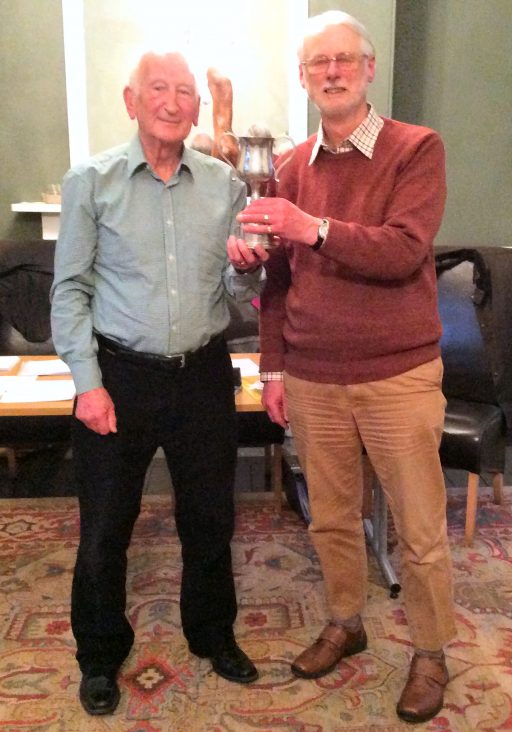
Our adjudicator this time was Canon Lisle Ryder, to whom we were very grateful for taking on the task at relatively short notice. He admitted to having failed O level English Literature but had been inspired to write poetry after a Poetry Retreat at Rydal Hall. Lisle’s other interests include enjoyment of art and paintings.
After sketching in his background and its relevance to the adjudication Lisle moved on to the ten stories entered in the competition. He said that he had enjoyed reading them several times each, looking to be entertained, intrigued, moved and drawn to sympathise. Stressing the need to avoid the inclusion of unnecessary information in a very short story, he added that he found descriptive passages helpful to his imagination. In reading the stories for a second or third time Lisle was looking at:
• choice of title
• impact of the opening passage
• structure of the story and its development
• paragraphing and sentence structure
• spatial and time settings
• what stimulated his imagination – metaphors – symbolism
• the overall integrity of the piece
• the existence of a message or meaning for the reader
• whether or not the ending resolves or leaves issue for the reader to ponder
Lisle then gave his individual comments on the stories before announcing his choice of winners which was:
Third – Cathy Grimmer with ‘The Head’.
This was a story about an artist so inspired by her mother’s letter that she unwittingly sculpts her father’s face as she would have wished him to be.
First equal – Phil Cook with ‘Three Sides to Every Story’ and Anna Greenwood with ‘Loss of Privacy’
In Anna’s absence Lisle was photographed presenting the trophy to Phil, whose story was a tale of revenge told from three points of view. A woman slighted by a fellow member of an Am Dram group writes a scathing review for the local paper of its next production.
After the break Sheila invited Lisle to read from his published collection ‘Momentoes’:
President David McAndrew gave a vote of thanks for the adjudication and presented Lisle with a ‘Thank You’ envelope plus a copy of our group anthology ‘Pieces of Cake’.
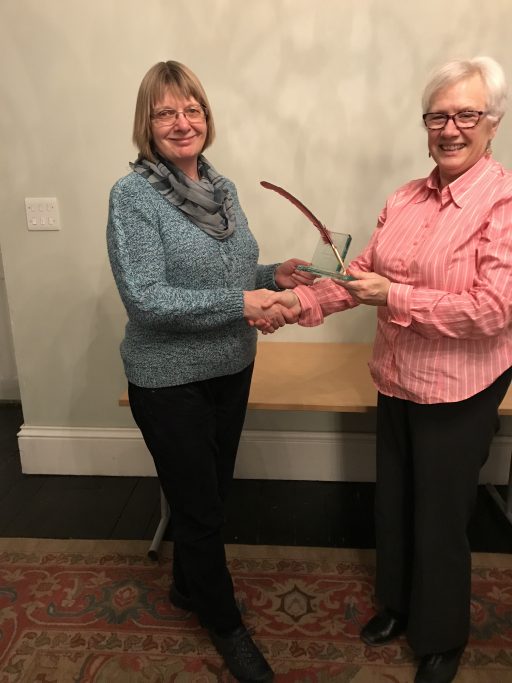
Susan received the trophy from Sheila last night. Scroll down for full details of the Poetry Competition adjudication.
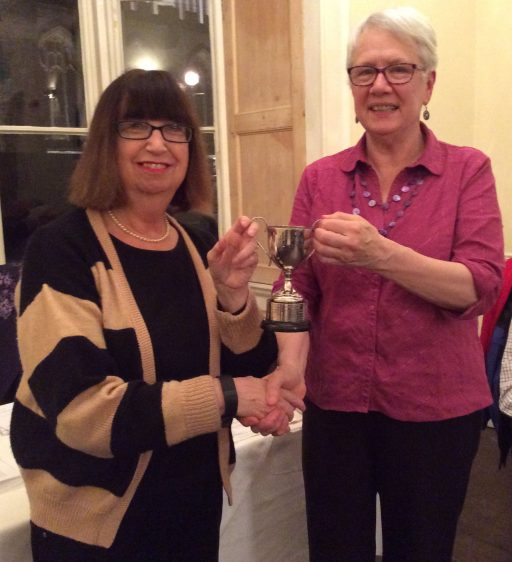
The President’s Cup is awarded annually to the member who has accrued the most points in our internal competitions.
The recipient this year was Maggie Cobbett. In the absence of the President, Chairman Sheila Whitfield made the presentation.
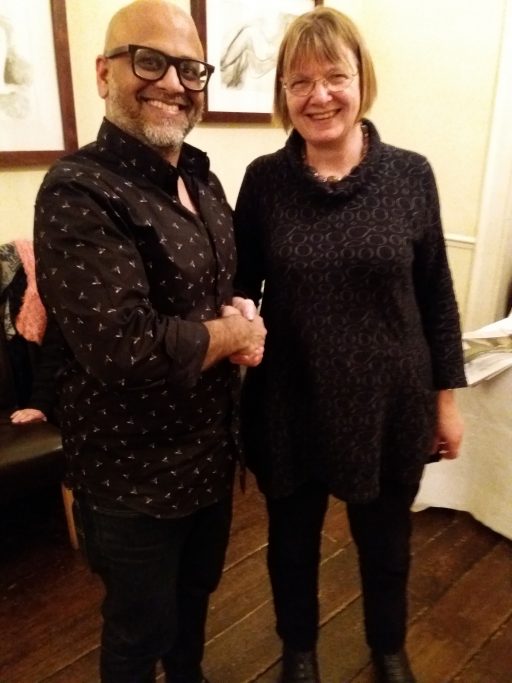
Sheila introduced Dr Nasser Hussain and invited him to give his adjudication of the 2017 Poetry Competition. Nasser began by talking about his own work, producing copies of his first published poetry collection and reading samples therefrom. His second collection is to be published in 2018. These later poems have moved on from his first collection as he has become more interested in the process of writing rather than the finished product. In his latest pieces of work he is testing what can be done by twisting language to do things it doesn’t normally do. He is asking himself, ‘Can I communicate in a new way?’
After talking about his work Nasser turned to the competition entries. His intention as an adjudicator, he said, was to help rather than to appear harsh; his critique is the beginning of a discussion rather than the last word. He had looked at the poems with five criteria in mind:
use of language
impact
focus
form
strength of concept
As he talked about specific poems he made the following general points.
• Avoid sentences of a single word
• The subject matter has to work literally as well as figuratively.
• Allow your reader’s imagination some freedom by being slightly ambiguous
• Plain/direct/clear speech is preferable to ‘fancy’
• Beware of using clichés or easy images
• Use contemporary language and forms for contemporary subjects (‘the writer must speak to their moment)
• Might the writer need to pay more attention to form?
• Is that form appropriate to the poem?
• It is good to create a disjunct between reality and imagination/fantasy
• Does the page need to be filled? Shortness, simplicity and truth can be just as effective. Don’t be afraid to cut.
• It is important to be aware of the audience when writing pieces ‘to’ people
• Is the concept suitable for poetry?
Having commented on the individual poems Nasser announced the winners as follows:
• 3rd place – Ian Gouge with ‘The Light of our Lives’, a poem about a fragment from outer space that had once glowed to light up the lives of the couple who had found it but had now lost its glow
• 2nd Place – Elizabeth Spearman with ‘Summer Visitor’, a poem about a summer visitor arriving in her garden
• 1st Place – Susan Perkins with ‘Gerunds’, a poetic reflection on communication.
Due to an oversight the trophy was not available for presentation, but Nasser was photographed congratulating Susan on her win. The winning entries were then read. Susan prefaced her reading with an explanation of how the poem came to be written. In Elizabeth’s absence, Nasser read on her behalf.
Susan thanked Nasser for his adjudication.
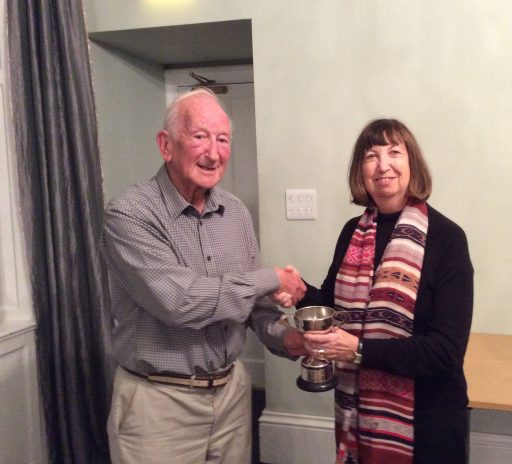
Unable to be present at the adjudication of the 2017 Mini-Saga adjudication (see below), Maggie was delighted to receive the trophy from Phil this evening.
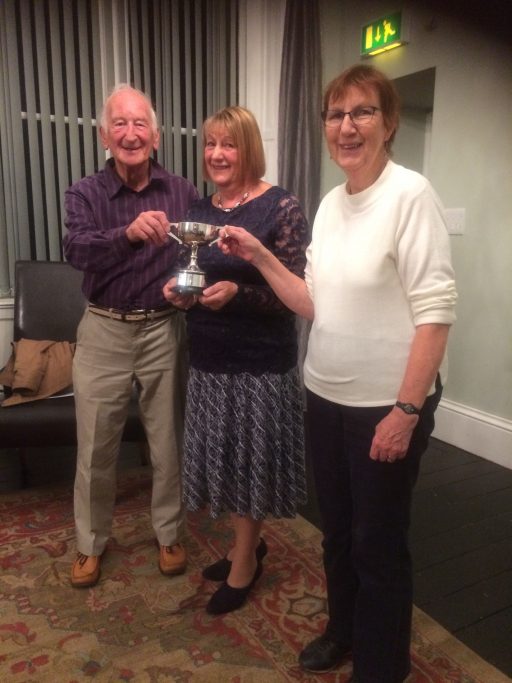
Jill Freeman began by explaining that she was there because the Competition trophy had been donated by her mother. Unlike many in her family she was not a writer herself but more of a story teller in the oral tradition. She went on to detail what she was looking for in her adjudication, concluding by summarising her thoughts in a mini saga of her own.
After the introduction Jill gave her individual comments on the nine competition entries and announced the results as follows:
• Joint Second – Phil Cook with ‘Maybe or Maybe not’ and Carol Mayer with ‘Early Electric? Save Your Breath’
• Winner – Maggie Cobbett with ‘Couple Separated by Heartless Social Workers after Sixty Years Together’
In Maggie’s absence Jill was unable to present the trophy but a suitable picture of her with the runners up was taken for the website.
The nine entries were then read as follows:
• Carol – ‘Early Electric? Save Your Breath’ – a reflection on the fact that successful electric traction predates diesel
• Phil – ‘Maybe or Maybe not’ – a punning reflection on the current uncertainties in the UK political scene
• Maggie (read by Sheila in Maggie’s absence) – ‘Couple Separated By Heartless Social Workers after Sixty Years Together’ – a civic dignitary responding to the newspaper headline of the title gets the opposite response to that expected when he arranges for the couple to be reunited
• Claire – ‘Metamorphose’ – a reflection on the life cycle of an insect
• Caroline – ‘Heart’s Desire’ – the breakfast-time reflections of an unhappy king
• Julie – ‘The Morning After the Night Before’ – a woman who has seduced one of her staff reminds him sexily that he mustn’t be late for work
• Janet – ‘The Reluctant Muse or Love’s Labours Lost’ – a dialogue in which a woman refuses The Bard’s advances
• Sheila – ‘Going Bye’ – a golfer misses his wife’s funeral to play in a key competition match
• Peter H – ‘Worldchange’ – the impact of a caveman accidentally discovering fire
Jill then rounded off her adjudication by telling the story of a short story competition she tried to enter but was thwarted by not putting enough postage on the envelope.
Sheila expressed the Group’s thanks to Jill for her adjudication.
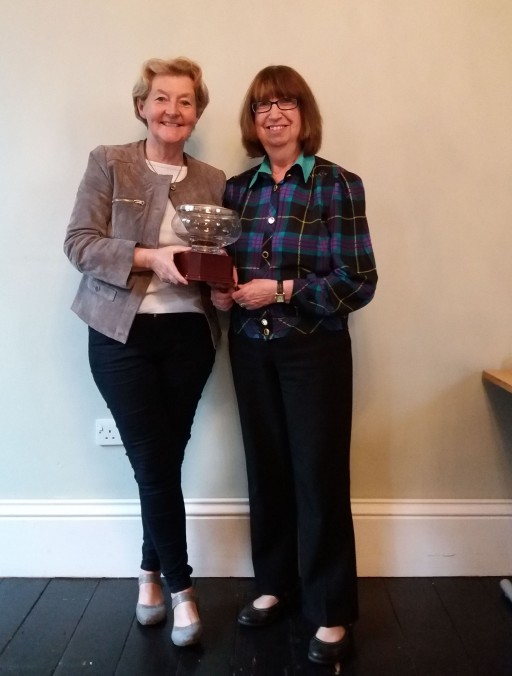
Sheila introduced adjudicator Janet Gleeson, explaining that Janet had had a career in journalism, working mainly as a news journalist in the North East and Yorkshire.
Janet began by saying that, having read the entries, she was pleased to have accepted the invitation to adjudicate this competition. She then confirmed some details of her adult life as a news journalist. Turning to the competition entries she said that she had been looking for something that was an interesting read, that kept the interest going throughout and which held her attention from start to finish. She said that she liked to find passion in the writing. In her own writing she liked to include quotations and suggested that this was something that all writers should consider.
Following her general introduction Janet gave her comments on each of the individual entries.
Summing up she said that, in addition to the use of quotations, the following points were likely to help in making a good article:
• Using personal experiences
• Using research
• Getting all the material down quickly before thinking about polishing it.
Sheila then invited Janet to announce her choice of winners. These were:
• 3rd place – Phil Cook with ‘Lucerne’s Lonely Lion’, a piece about the statue of a lion in Lucerne which commemorates the involvement (with heavy loss of life) of a Swiss contingent in the fighting that accompanied the French Revolution
• 2nd place – Caroline Slator with ‘The Vanity of Small Differences’, a piece about Grayson Perry and his work
• 1st place – Maggie Cobbett with ‘In Praise of Notebooks’ – a piece about her personal passion for notebooks, now and in her schooldays. This came with a side order of reflection on how the attitude of coffee shop management towards writers who commandeer their tables has changed since her youth
There was time before the break for Janet to talk about the way the newspaper industry had changed during her lifetime. She compared her own good fortune – being offered four jobs on completion of her journalism course at Darlington College – with the pressures that face newcomers today.
« Newer Entries | Older Entries »








